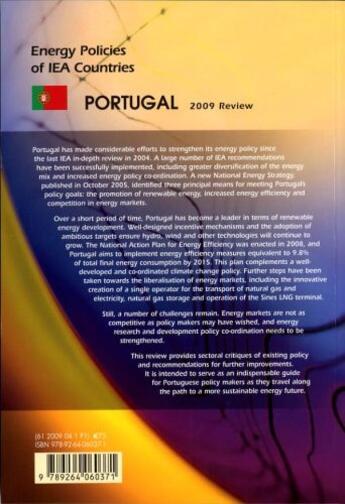-
Date de parution : 17/09/2009
-
Editeur :
Ocde
-
EAN : 9789264060371
-
Série :
(-)
-
Support :
Papier
Résumé:
The International Energy Agency's 2009 review of Portugal's energy policies and programmes. This edition finds that Portugal has made considerable efforts to strengthen its energy policy since the last IEA in-depth review in 2004. A large number of IEA recommendations have been successfully... Voir plus
The International Energy Agency's 2009 review of Portugal's energy policies and programmes. This edition finds that Portugal has made considerable efforts to strengthen its energy policy since the last IEA in-depth review in 2004. A large number of IEA recommendations have been successfully implemented, including greater diversification of the energy mix and increased energy policy co-ordination. A new National Energy Strategy, published in October 2005, identified three principal means for meeting Portugal's policy goals: the promotion of renewable energy, increased energy efficiency and competition in energy markets.
Over a short period of time, Portugal has become a leader in terms of renewable energy development. Well-designed incentive mechanisms and the adoption of ambitious targets ensure hydro, wind and other technologies will continue to grow. The National Action Plan for Energy Efficiency was enacted in 2008, and Portugal aims to implement energy efficiency measures equivalent to 9.8% of total final energy consumption by 2015. This plan complements a well developed and co-ordinated climate change policy. Further steps have been taken towards the liberalisation of energy markets, including the innovative creation of a single operator for the transport of natural gas and electricity, natural gas storage and operation of the Sines LNG terminal.
Still, a number of challenges remain. Energy markets are not as competitive as policy makers may have wished, and energy research and development policy coordination needs to be strengthened.
This review provides sectoral critiques of existing policy and recommendations for further improvements. It is intended to serve as an indispensable guide for Portuguese policy makers as they travel along the path to a more sustainable energy future.
Donner votre avis














